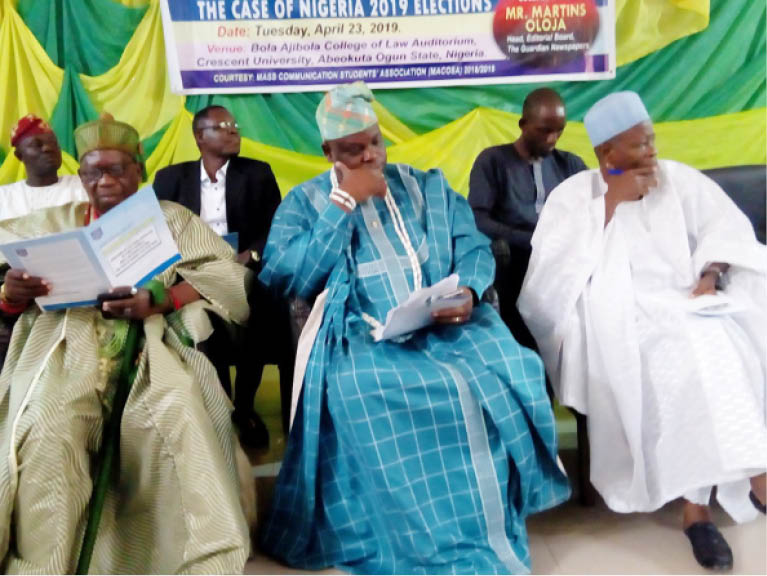Did the media cover or cover-up 2019 elections?
Nearly a month after the conclusion of the 2019 elections in Nigeria, the role played by the media in the coverage of the process is being evaluated, a development which popped up a poser: did media cover or cover-up the polls? The venue, Bola Ajibola College of Law Auditorium, Crescent University, Abeokuta, Ogun State was […]

(L- R) Oba Olufemi Ogunleye, Towulade of Akinale, Olota of Ota, Oba Abdul-Kabir Adeyemi Obalanlege and the Dean of College of Arts, Social and Management Sciences, Crescent University, Abeokuta, Ogun State at the lecture by the Association of Communication Scholars and Professionals of Nigeria (ACSPN). Photo: Peter Moses
Nearly a month after the conclusion of the 2019 elections in Nigeria, the role played by the media in the coverage of the process is being evaluated, a development which popped up a poser: did media cover or cover-up the polls?
The venue, Bola Ajibola College of Law Auditorium, Crescent University, Abeokuta, Ogun State was sparsely filled with media practitioners, journalism scholars, teachers as well as Mass Communication students. Two traditional rulers, among the personalities, the Olota of Ota, Oba Abdul-Kabir Adeyemi Obalanlege, is a Professor of Mass Communication in the university, while Oba Olufemi Ogunleye of Towulade of Akinale is equally a veteran journalist.
They all gathered at a lecture “April 2019 edition of Empowerment Series” of the Association of Communication Scholars and Professionals of Nigeria (ACSPN), to appraise the media’s performance in the just-concluded elections. The lecture was themed “Challenge of electoral reporting in a multi-ethnic and multi-religious setting: The case of Nigeria 2019 elections.”
A veteran journalist, Tunde Oladunjoye set the tone for the day’s discussion, when he submitted that “… to get the best from any profession, including journalism or mass media practice; practitioners should be well trained, well grounded, and well remunerated.”
Oladunjoye, a media practitioner turned politician, added “The issues of poor pay, slavishly allowances and backlog of unpaid salaries continue to bedevil our profession and its practice so much that even quacks from other professions continue to ridicule, harass, embarrass and irritate media men and women as if there is no big deal in reporting. Indeed, there is a big deal in reporting.”
And was the turn of the Guest Lecturer, Martins Oloja, the Executive Head, Editorial Board of The Guardian Newspapers. Oloja told the gathering that “there is a sense in which we cannot assess the last elections in Nigeria without situating it within the context of how the media have covered the processes leading to the elections and, of course, the elections proper.”
Fondly called “The Dean” by his colleagues, Oloja knocked journalists, saying they could have played better in role in Electoral Reform, expose vote buyers and sellers and focused on the unusual political actors rather than the known actors in the nation’s politics.
“The Nigeria media did not highlight through reports and editorials the consequences of president’s failure to sign the electoral reform bill into law. The national assembly too got trapped in dirty politics nurtured by ethnic and religious ambush. The media didn’t ask enough questions around the failure of leadership at all levels on this.
“Nigerian voters should have known better about these politically exposed people. There should have been some journalistic legworks on these people for who and what they are. There are reasons most of them could not win elections,” he said.
In the 14-page lecture, Oloja maintained that covering election must be within the context of democratic development. He noted “a difficult relationship between journalism and political power is a hallmark of democratic society.
“These are issues in democratic election news that would have enriched content of political stories at this time. In 2019, can anyone remember some significant stories, some scoops that could have defined some moments in 2019 election process?” he asked.
Ahead of 2023 polls, Oloja said journalists “need to embrace and teach significant aspect of financial journalism: the money trail approach in holding our governments to account for the money they collect as Internally Generated Revenue (IGR) and then from Abuja every month.
“We need to cover and draw attention to all the state laws that give too much money to the governors even out of office. The severance packages for the governors have been too much and our state correspondents have been too quiet about all these during elections.
“We need to hold our federal legislators to account and to be more fiscally responsible for one reason: that the 1999 constitution gives the power to protect national treasury to them,” he pointed out.
In his remarks, Obalanlege harped on the need to embrace data journalism saying it would go a long way in ensuring accurate reports “as facts and figures will be presented.”
On his part, another journalism scholar, Professor Lai Oso commended the guest speaker and the association for organizing the lecture, which he noted would go a long way in enriching journalism practice.
